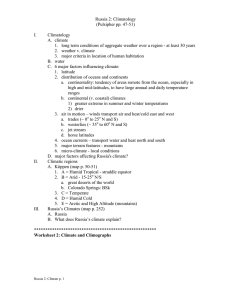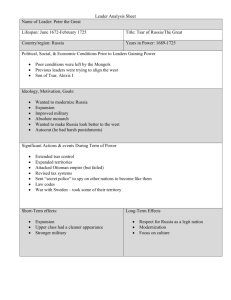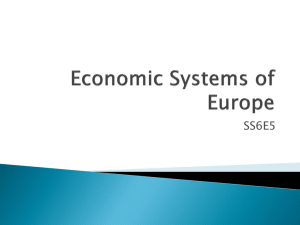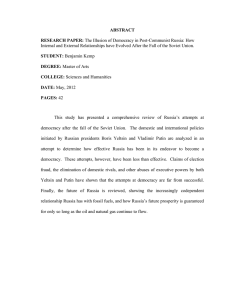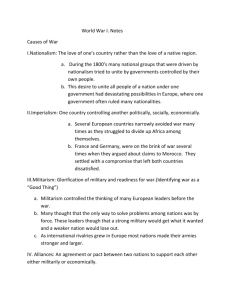Russia Will Raise World Bank Donations, Enhancing Global Role
advertisement
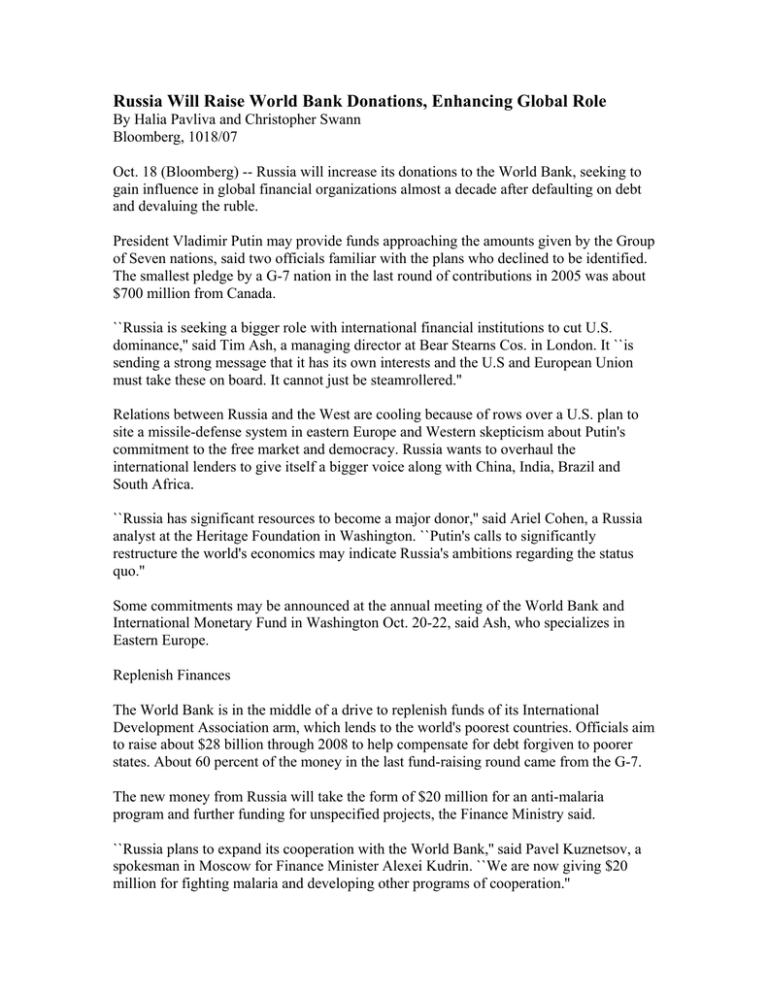
Russia Will Raise World Bank Donations, Enhancing Global Role By Halia Pavliva and Christopher Swann Bloomberg, 1018/07 Oct. 18 (Bloomberg) -- Russia will increase its donations to the World Bank, seeking to gain influence in global financial organizations almost a decade after defaulting on debt and devaluing the ruble. President Vladimir Putin may provide funds approaching the amounts given by the Group of Seven nations, said two officials familiar with the plans who declined to be identified. The smallest pledge by a G-7 nation in the last round of contributions in 2005 was about $700 million from Canada. ``Russia is seeking a bigger role with international financial institutions to cut U.S. dominance,'' said Tim Ash, a managing director at Bear Stearns Cos. in London. It ``is sending a strong message that it has its own interests and the U.S and European Union must take these on board. It cannot just be steamrollered.'' Relations between Russia and the West are cooling because of rows over a U.S. plan to site a missile-defense system in eastern Europe and Western skepticism about Putin's commitment to the free market and democracy. Russia wants to overhaul the international lenders to give itself a bigger voice along with China, India, Brazil and South Africa. ``Russia has significant resources to become a major donor,'' said Ariel Cohen, a Russia analyst at the Heritage Foundation in Washington. ``Putin's calls to significantly restructure the world's economics may indicate Russia's ambitions regarding the status quo.'' Some commitments may be announced at the annual meeting of the World Bank and International Monetary Fund in Washington Oct. 20-22, said Ash, who specializes in Eastern Europe. Replenish Finances The World Bank is in the middle of a drive to replenish funds of its International Development Association arm, which lends to the world's poorest countries. Officials aim to raise about $28 billion through 2008 to help compensate for debt forgiven to poorer states. About 60 percent of the money in the last fund-raising round came from the G-7. The new money from Russia will take the form of $20 million for an anti-malaria program and further funding for unspecified projects, the Finance Ministry said. ``Russia plans to expand its cooperation with the World Bank,'' said Pavel Kuznetsov, a spokesman in Moscow for Finance Minister Alexei Kudrin. ``We are now giving $20 million for fighting malaria and developing other programs of cooperation.'' He declined to comment on how much more Russia will give. Russia, which until now has made only token donations to the IDA, wrote off $10 billion of Afghan debt and plans to forgive money owed by Iraq this year. In April 2005, it promised to contribute $58.5 million over three years to the IDA. `Colonial' Era ``A bigger handout to the IDA would help Russia be seen as a full player,'' said Dennis de Tray, a former World Bank director who now works at the Center for Global Development, a Washington-based research institute. The U.S. has always picked the head of the World Bank, while Europeans have chosen the managing director of the IMF. The European Union candidate, Dominique Strauss-Kahn, was elected IMF managing director last month. Russia backed Josef Tosovsky and, by nominating its own candidate, sought to signal that ``the era of colonial empires is coming to an end,'' wrote Kudrin in remarks on his official Web site on Oct. 5. ``The role of countries such as China, India and Brazil in the world economy is growing and it is impossible not to take this into account in the organization of the global financial system.'' Russia's oil wealth is growing as Putin tightens his grip on the nation's petroleum and mineral resources. The economy has grown an average 6 percent a year since he became president in 2000. `Spare Cash' State-run OAO Gazprom has taken control of $8.5 billion in projects from Royal Dutch Shell Plc and BP Plc. The government dismantled OAO Yukos Oil Co., once Russia's largest oil exporter, and state-run OAO Rosneft bought most of its assets at auction. ``They have enough spare cash,'' Ash said. ``It will be interesting to see how many countries they can rally around them.'' Russia's foreign currency and gold reserves, the world's third largest, have grown to almost $425 billion at the end of September, from $12 billion in 1998. A fund that accumulates some of its revenue from crude-oil sales is worth about $141 billion. Russia has 79.5 billion barrels of untapped oil, the sixth- largest reserve in the world, behind Saudi Arabia, Iran, Iraq, Kuwait and Venezuela, according to 2006 figures published by London-based BP. ``Russia's bonanza will continue and its economic clout will keep growing,'' said Cohen of the Heritage Foundation.


